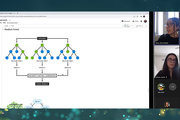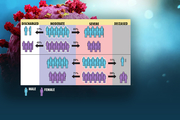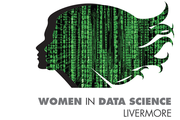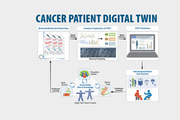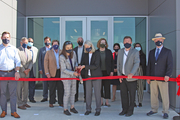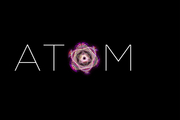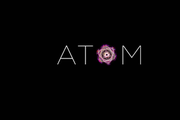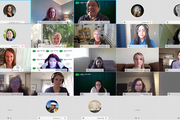Did you know we have a monthly newsletter? View past volumes and subscribe.
Machine learning model finds COVID-19 risks for cancer patients
March 10, 2022 -
A new study by researchers at LLNL and the University of California, San Francisco, looks to identify cancer-related risks for poor outcomes from COVID-19. Analyzing one of the largest databases of patients with cancer and COVID-19, the team found previously unreported links between a rare type of cancer—as well as two cancer treatment-related drugs—and an increased risk of hospitalization...
Winter hackathon meets WiDS datathon
March 9, 2022 -
Sponsored by the DSI, LLNL’s winter hackathon took place on February 16–17. Hackathons are 24-hour events that encourage collaborative programming and creative problem solving. In addition to traditional hacking, the hackathon included a special datathon competition in anticipation of the Women in Data Science (WiDS) conference on March 7. Hackathon and datathon participants presented their...
LLNL team models COVID-19 disease progression and identifies risk factors
Feb. 15, 2022 -
An LLNL team has developed a comprehensive dynamic model of COVID-19 disease progression in hospitalized patients, finding that risk factors for complications from the disease are dependent on the patient’s disease state. Using a machine learning algorithm on a dataset of electronic health records from more than 1,300 hospitalized COVID-19 patients with ProMedica — the largest health care...
WiDS Livermore returns on March 7
Feb. 10, 2022 -
We are hosting our 5th WiDS Livermore regional event to encourage our community of women in computing. We will watch the WiDS Stanford Livestream as well as feature Lab-focused technical talks, mentoring breakout sessions, and a career panel.
WiDS Livermore is an independent event hosted by LLNL Ambassadors as part of the annual Women in Data Science (WiDS) Worldwide conference organized by...
COVID-19 R&D: Computing responds to pandemic
Jan. 19, 2022 -
When the COVID-19 pandemic began, the Laboratory immediately started seeking solutions to the myriad challenges posed by the global crisis. The Computing Directorate jumped right in with research and development activities that combine molecular screening to inform antiviral drug experimentation; a generative molecular design software platform to optimize properties of antiviral drugs; an...
Unprecedented multiscale model of protein behavior linked to cancer-causing mutations
Jan. 10, 2022 -
LLNL researchers and a multi-institutional team have developed a highly detailed, machine learning–backed multiscale model revealing the importance of lipids to the signaling dynamics of RAS, a family of proteins whose mutations are linked to numerous cancers. Published by the Proceedings of the National Academy of Sciences, the paper details the methodology behind the Multiscale Machine...
Digital twins for cancer patients could be ‘paradigm shift’ for predictive oncology
Dec. 16, 2021 -
A multi-institutional team, including an LLNL contributor, has proposed a framework for digital twin models of cancer patients that researchers say would create a “paradigm shift” for predictive oncology. Published online Nature Medicine on November 25, the proposed framework for Cancer Patient Digital Twins (CPDTs) — virtual representations of cancer patients using real-time data — would...
LLNL joins Human Vaccines Project to accelerate vaccine development and understanding of immune response
Oct. 21, 2021 -
LLNL has joined the international Human Vaccines Project (HVP), bringing Lab expertise and computing resources to the consortium to aid development of a universal coronavirus vaccine and improve understanding of immune response. The HVP is a nonprofit, public-private partnership with a mission to decode the human immune system and accelerate the development of vaccines and immunotherapies...
Tackling the COVID-19 pandemic
Oct. 11, 2021 -
To help the U.S. fight the COVID-19 pandemic, LLNL did what it does best: quickly bring together interdisciplinary teams and diverse technologies to address urgent national challenges. This effort includes applying advanced high-performance computing resources to biological research and anayzing complicated computer models and enormous datasets. Read more in Science & Technology Review.
Inaugural industry forum inspires ML community
Sept. 16, 2021 -
LLNL held its first-ever Machine Learning for Industry Forum (ML4I) on August 10–12. Co-hosted by the Lab’s High-Performance Computing Innovation Center (HPCIC) and Data Science Institute (DSI), the virtual event brought together more than 500 enrollees from the Department of Energy (DOE) complex, commercial companies, professional societies, and academia. Industry sponsors included...
Visualization software stands the test of time
Sept. 13, 2021 -
In the decades since LLNL’s founding, the technology used in pursuit of the Laboratory’s national security mission has changed over time. For example, studying scientific phenomena and predicting their behaviors require increasingly robust, high-resolution simulations. These crucial tasks compound the demands on high-performance computing hardware and software, which must continually be...
60 years of cancer research
Sept. 10, 2021 -
From studying radioactive isotope effects to better understanding cancer metastasis, the Laboratory’s relationship with cancer research endures some 60 years after it began, with historical precedent underpinning exciting new research areas. In one Cancer Moonshot project, research includes a close synergy between experiments and computation, allowing scientists to get a better picture of the...
LLNL, NNSA and elected officials celebrate opening of Livermore Valley Open Campus expansion
Aug. 26, 2021 -
Leaders from the NNSA, Congressional representatives and local elected officials gathered at LLNL on August 10 to celebrate an expansion to the Livermore Valley Open Campus (LVOC). The Lab hosted a ribbon-cutting ceremony for a new office building (Bldg. 642) and a conference annex (Bldg. 643), which will provide modern office and meeting space for LLNL researchers in predictive biology...
LLNL/ATOM engagement with Purdue introduces students to drug design modeling
Aug. 9, 2021 -
Through an engagement with Purdue University’s The Data Mine learning community, LLNL and Purdue are partnering to speed up drug design using computational tools under the Accelerating Therapeutic Opportunities in Medicine (ATOM) project. Over two recent semesters (fall 2020 and spring 2021), LLNL bioinformatics scientist and ATOM researcher Jonathan Allen mentored a cohort of 20...
Career panel series kicks off with women in Computing leadership roles
July 6, 2021 -
More than 100 LLNL staff and students gathered virtually for the first session of a new career panel series inspired by the annual WiDS conference and sponsored by the DSI. Panelists discussed how they have shaped their careers at the Lab and in Computing, their journeys into leadership roles, and how they navigate career challenges. Data scientist and panel series organizer Cindy Gonzales...
COVID-19 HPC Consortium reflects on past year
April 1, 2021 -
COVID-19 HPC Consortium scientists and stakeholders met virtually on March 23 to mark the consortium’s one-year anniversary, discussing the progress of research projects and the need to pursue a broader organization to mobilize supercomputing access for future crises. The White House announced the launch of the public-private consortium, which provides COVID-19 researchers with free access to...
ATOM Consortium welcomes 3 DOE national labs to accelerate drug discovery
March 29, 2021 -
The Accelerating Therapeutics for Opportunities in Medicine (ATOM) consortium, of which LLNL is part, announced the U.S. Department of Energy’s Argonne, Brookhaven and Oak Ridge national laboratories are joining the consortium to further develop ATOM’s AI-driven drug discovery platform. The public-private ATOM consortium aims to transform drug discovery from a slow, sequential and high-risk...
Lab event encourages growth of women in data science
March 17, 2021 -
Coinciding with International Women’s Day on March 8, LLNL’s 4th Women in Data Science (WiDS) regional event brought women together to discuss successes, opportunities and challenges of being female in a mostly male field. The Lab’s first-ever virtual WiDS gathering attracted dozens of LLNL data scientists as well as some from outside the Lab, and featured speakers, a career panel and...
'Self-trained' deep learning to improve disease diagnosis
March 4, 2021 -
New work by computer scientists at LLNL and IBM Research on deep learning models to accurately diagnose diseases from X-ray images with less labeled data won the Best Paper award for Computer-Aided Diagnosis at the SPIE Medical Imaging Conference on February 19. The technique, which includes novel regularization and “self-training” strategies, addresses some well-known challenges in the...
Model for COVID-19 drug discovery a Gordon Bell finalist
Nov. 17, 2020 -
A machine learning model developed by a team of LLNL scientists to aid in COVID-19 drug discovery efforts is a finalist for the Gordon Bell Special Prize for High Performance Computing-Based COVID-19 Research. Using Sierra, the world’s third fastest supercomputer, LLNL scientists produced a more accurate and efficient generative model to enable COVID-19 researchers to produce novel compounds...


